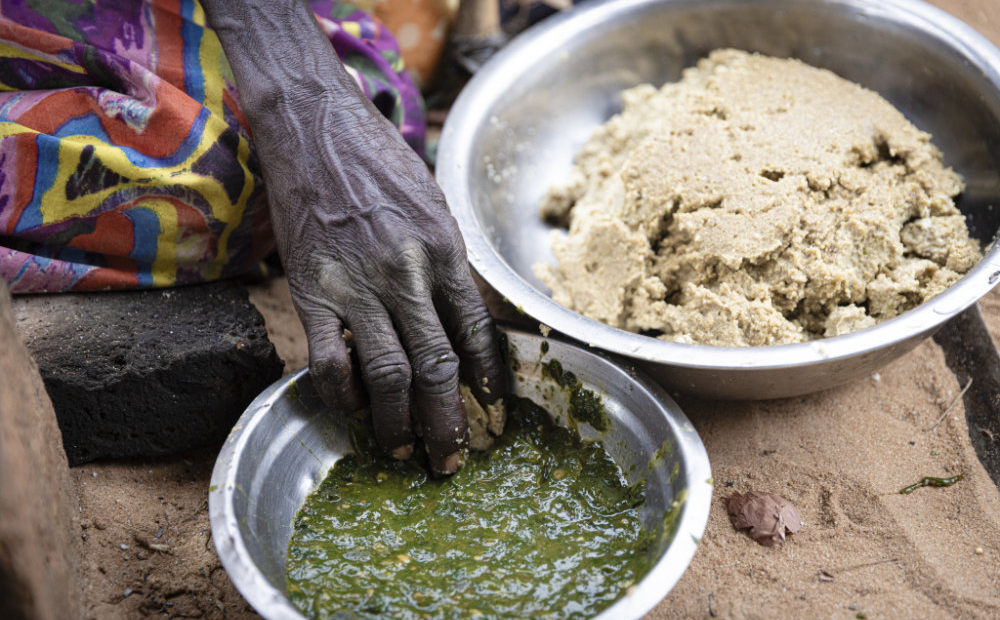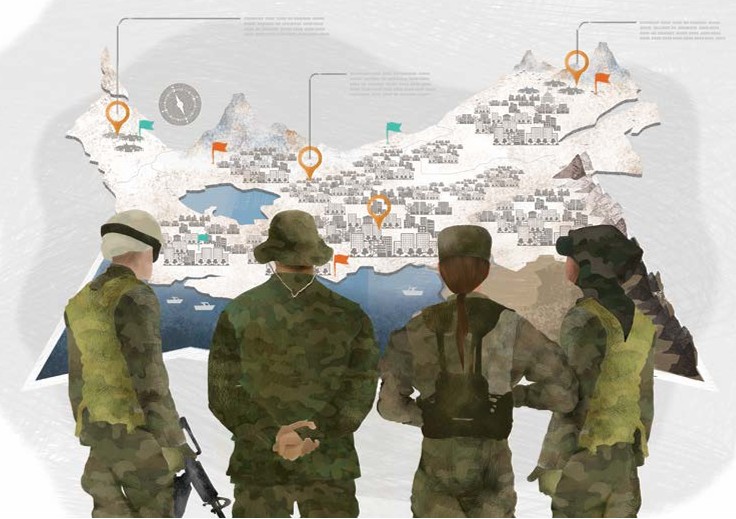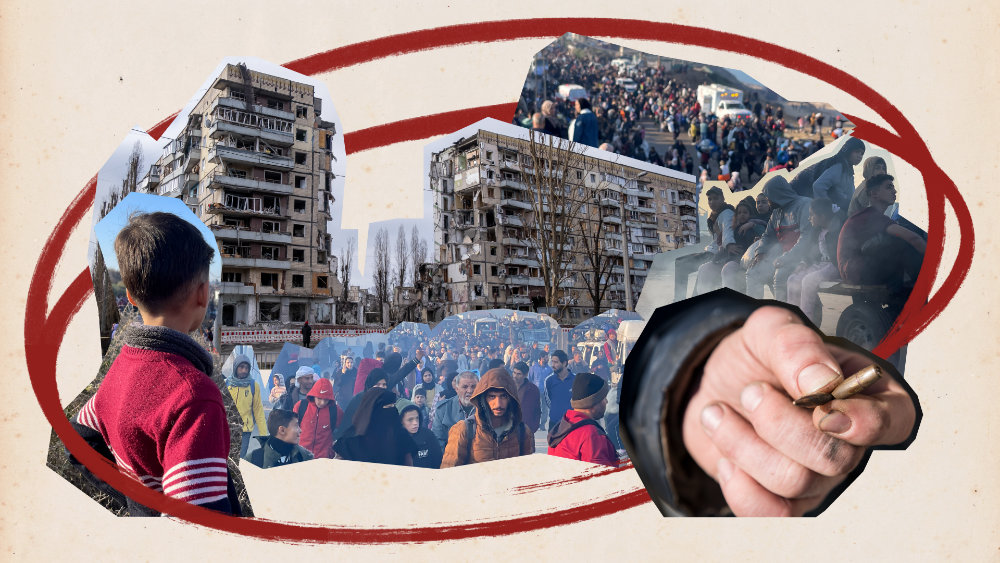Food insecurity remains a critical issue in modern armed conflicts, exacerbated by the mutually reinforcing effects of conflict, economic shocks, and climate change. In response, the ICRC’s 2024 Challenges Report emphasizes how compliance with a broad range of rules of international humanitarian law (IHL) can help avoid acute food crises, and highlights a number of contemporary obstacles to achieving such compliance in practice.
In this post, ICRC Legal Adviser Matt Pollard highlights key legal protections under IHL, including the prohibition against using starvation as a method of warfare. He stresses the importance of a much wider range of rules relevant to safeguarding civilian access to essential resources like food and water, and outlines how avoiding unduly narrow interpretations of such IHL rules is essential to reducing food insecurity and its devastating long-term effects during armed conflicts.
Acute food insecurity affected some 282 million people throughout the world in 2023, owing to the mutually reinforcing impact of conflict, extreme weather, economic shocks and trade disruptions. Conflict and insecurity were the primary driver of hunger for 135 million people and a contributing factor for millions more.
All too often, states react to the impact of conflict on food security only after a situation has already developed into an acute food crisis, narrowing the focus to the issue of access for humanitarian relief. Respect, from the onset of the conflict, for the full range of IHL rules described below can help prevent situations from developing into extreme food crises in the first place.
The prohibition against starvation of civilians as a method of warfare
IHL prohibits starvation of civilians as a method of warfare. Starvation means deprivation of food, water or other things necessary for survival. The deprivation need not be so severe as to cause death; it is enough that it would cause suffering.
To use starvation as a method of warfare means to provoke it deliberately. A prominent example is deprivation of food and water during sieges. Another is destroying foodstuffs and water supplies, and the means to produce and distribute them, to deprive an adversary of their sustenance value. To conclude that a party is deploying starvation as a method of warfare, one need not wait until civilians are actually starving.
The prohibition applies to starvation of civilians. It does not address starvation of armed forces. However, this does not mean that the prohibition applies only to acts taken with the specific purpose of starving civilians. At minimum, indiscriminate use of starvation as a method of warfare is also prohibited, i.e. where the deprivation of food and water or other things necessary for survival cannot be or is not directed exclusively at armed forces. For example, a besieging party could not justify deliberate mass starvation of civilians by claiming that its specific purpose was only to starve enemy fighters who were also in the area. Furthermore, both the besieging and the besieged party must allow civilians to leave and must continue to comply with IHL rules on humanitarian relief and conduct of hostilities, including in relation to any civilians who remain.
Nothing in the ordinary meaning of the wording of the prohibition indicates that it was meant to allow for indiscriminate use of starvation as a method of warfare. Furthermore, such an interpretation would be inconsistent with the intentions reflected in the corollary rule on “objects indispensable” in Article 54(2) and (3) of Additional Protocol I, discussed below. First, Article 54(2) explicitly refers to “the specific purpose of denying them for their sustenance value to the civilian population or to the adverse Party” [emphasis added].
Second, the exception in Article 54(3)(b), where an object is being used in direct support of military action, is subject to the overriding provision that “in no event shall actions against these objects be taken which may be expected to leave the civilian population with such inadequate food or water as to cause its starvation or force its movement.”
The reference to starvation as a method of warfare does not cover all starvation caused by warfare. For instance, starvation caused by a general disruption of transportation systems as an incidental result of the armed conflict would not necessarily be covered by the prohibition, unless a party was seeking thereby to provoke starvation. However, acts that could cause starvation but cannot be described as the use of starvation as a ‘method of warfare’ may still be prohibited by other rules of IHL.
Protection for objects indispensable to the survival of the civilian population
IHL gives special protection to “objects indispensable to the survival of the civilian population, such as food-stuffs, agricultural areas for the production of foodstuffs, crops, livestock, drinking water installations and supplies and irrigation works”. The types of objects covered by the rule are not limited to these examples.
For instance, depending on the circumstances, housing, clothing or fuel could also be included, as well as certain types of energy infrastructure or communications infrastructure on which objects indispensable to the survival of the civilian population depend.
Attacking, destroying, removing, or rendering useless such objects is prohibited. These terms were meant to cover all possible means, including the use of chemicals to contaminate water reservoirs or defoliate crops.
Cyber operations are also covered by this prohibition. The possibility that damage or a disabling effect might eventually be repaired or reversed does not remove it from the scope of the prohibition.
Exceptions to the prohibition exist where the objects are used as sustenance solely for the members of armed forces, or in direct support of military action (such as providing cover) – see for example Article 54(3) of the Additional Protocol I. However, even in these circumstances, “in no event shall actions against these objects be taken which may be expected to leave the civilian population with such inadequate food or water as to cause its starvation or force its movement”.
Some states insist that this prohibition applies only to acts carried out for specific purposes. However, even on such a narrow reading, as was noted above, Article 54(2) of Additional Protocol I explicitly includes the purpose of denying the objects’ sustenance value “to the adverse Party”, not only to the civilian population.
In any event, the ICRC’s study on customary IHL did not formulate the relevant rule to include a purpose requirement, commenting that with regard to international armed conflict, most military manuals “do not indicate such a requirement and prohibit attacks against objects indispensable to the survival of the civilian population as such”.
In the view of the ICRC, at a minimum, to ensure that the rule is fully complied with and realizes its intended protective effect, it is essential that no action, whatever its purpose, be taken against “objects indispensable” wherever the action “may be expected to leave the civilian population with such inadequate food or water as to cause its starvation or force its movement”.
Other relevant rules of IHL
Other IHL obligations are also pertinent to food security. For instance, parties have obligations to ensure the provision of supplies essential to the survival of the civilian population under their control, including food and water. Parties, and other states, also have obligations to allow and facilitate humanitarian relief, subject to their right of control.
In addition, IHL rules on distinction, proportionality and precautions in attack provide general protection to civilian objects, including civilian transport infrastructure, marketplaces and other civilian objects that contribute indirectly to civilian food supply, even when they do not necessarily constitute objects indispensable to the survival of the civilian population.
IHL also prohibits or regulates the use of certain weapons with a widespread and long-lasting adverse impact on food security, such as landmines and cluster munitions. It provides for protection of the natural environment. Works and installations containing dangerous forces, such as dykes, dams and nuclear power plants, also receive special protection. Rules on naval blockade, and on pillage and other acts in relation to public and private property, are also relevant.
Hostilities conducted intensely and on a continuous basis could make it effectively impossible, for prolonged periods, to deliver adequate humanitarian assistance. Parties must ensure that the manner in which they conduct hostilities is compatible with their obligations to ensure supply of food, water and other essential items to populations under their control and to allow and facilitate humanitarian relief. In situations of occupation, for instance, the Occupying Power must ensure, to the fullest extent of the means available to it, the food and medical supplies of the population, including by bringing in the necessary foodstuffs, medical stores and other items if the resources of the occupied territory are inadequate. If the whole or part of the population of an occupied territory is inadequately supplied, the Occupying Power must agree to relief schemes and must “facilitate them by all the means at its disposal”, which in some circumstances could involve adjustments to its military operations. A similar obligation applies in situations other than occupation.
Preventing interference with an ongoing or imminent military operation could in exceptional circumstances justify regulating – but not prohibiting – humanitarian access; however, any legal or practical restrictions on the freedom of movement of humanitarian personnel must be temporary and geographically restricted so as not to unduly delay relief operations or make their implementation impossible. ‘Humanitarian corridors’ (agreements between parties to permit safe passage for a limited time in a specific geographic area) or ‘humanitarian pauses’ (temporary suspension of hostilities) sometimes enable delivery of humanitarian relief and assistance that hostilities might otherwise have made impossible. In the view of the ICRC, however, such mitigatory measures do not necessarily fulfil the ongoing legal obligations of the parties and cannot be used to justify limiting or refusing to implement IHL rules on humanitarian access and activities at other times or places.
Challenges to effective protection in practice
In addition to unduly narrow interpretations of IHL as described earlier, an overarching challenge to preventing food insecurity is simple non-compliance with IHL. Later sections of this report on the implementation of IHL and repression of violations are pertinent and should be acted upon with urgency in this context. Ratification of the Rome Statute amendment bringing the war crime of starvation of civilians in non-international armed conflicts within the jurisdiction of the International Criminal Court could further contribute to increasing respect for the relevant IHL rules.
Beyond their immediate impact, armed conflicts do lasting damage to food systems – for instance, in connection with seed production, irrigation and trade networks – undermining long-term food security. Concerted action is needed before, during, and after conflicts to address points of disruption, and other drivers of food insecurity at all levels of the food system, to reduce risks and strengthen resilience.
Food insecurity magnifies protection concerns, prompting harmful coping strategies and heightening risks of exploitation and marginalization. Support adapted to the needs of individuals or groups who are more vulnerable to food insecurity and malnutrition, owing to societal and situational barriers, must therefore remain a priority: it should take into account factors such as gender, age, disability and sexual orientation.
When global supply chains for food and fertilizer are disrupted by armed conflicts, that can also impact populations far from the actual hostilities. Respect for the relevant IHL rules could indirectly help mitigate the impact of conflict on the international trade in food and fertilizer. However, IHL focuses mainly on the populations in the countries in conflict or directly affected in other ways by attacks and military operations.
At minimum, where such external impact is likely, the parties to a conflict and other states should take urgent action to limit the consequences for food security beyond their borders. IHL encourages parties to adopt special agreements or other, similar means to address such practical challenges.
See also
- Tilman Rodenhäuser, Internment by non-state armed groups: legal and practical limits, October 15, 2024
- Cordula Droege, Championing IHL compliance in contemporary armed conflict: the 2024 ICRC Challenges Report, October 9, 2024
- Ariana Lopes Morey, Menty Kebede, Matt Pollard, Beyond access: three considerations for food security and famine prevention during armed conflict, April 14, 2022





